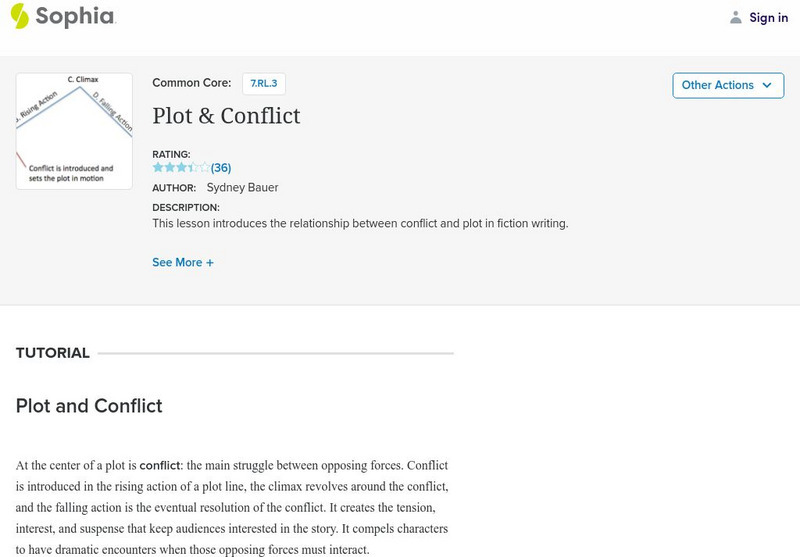Hi, what do you want to do?
Cerebellum
The Elements Of Fiction - Plot Structure And Types Of Narrative
The Elements of Fiction - Ernest Hemingway, Mark Twain, Robert Louis Stevenson . These are just three of the renowned authors whose work is cited in The Elements of Fiction, which explores: Plot elements, character, conflict, flashback,...
The Learning Depot
Elements of Literary Fiction: Characters, Setting, Plot, Theme, and Point of View
Literary elements are the technical components in all narrative stories. They are the universal and essential elements of all narrative fiction. And all are integral to creating the basic structure of a story in an engaging, compelling,...
Englishing
ESL - The Structure of a Short Story - (including plot diagram)
What is a short story? and What do we need to write one?. These are some of the questions Mr. P. will answer regarding short stories. He will first start the lesson by introducing the elements of a short story. Then, he will focus on the...
Curated Video
Multiple Plot Lines
“Multiple Plot Lines” will explain how to write a story using multiple plots.
Curated Video
Purpose of Conflict
A video titled "Purpose of Conflict" which details the different types of conflict a character might face in a story.
Curated Video
Elements of Plot: A Guilty Conscience
Elements of Plot: A Guilty Conscience identifies elements of plot, including exposition, rising action, climax, falling action, resolution, found in the short story, A Guilty Conscience.
Curated Video
Fiction: The Make-Up of a Made-Up Story
Mr. Griot uses the story “Blue Hole” to demonstrate the characteristics of fiction, plot, and conflict resolution.
Curated Video
Story Elements
Learn to create a story elements graphic organizer to find the characters, setting, plot, conflict, resolution and theme to a fiction story.
Curated Video
The Kelsey’s Vacation
Mr. Griot explains how to write a short story and include all of the narrative elements, like setting, character, plot, conflict, climax, and resolution.
Curated Video
Plot In Biblical Narrative
An important part of reading biblical narratives is learning how to understand the nature of "the plot," how stories are arranged into a pattern of conflict and resolution. In this video we'll see how ignoring the sequence of the plot...
Curated Video
A Midsummer Night's Dream 2.1 Interview: Oberon and Puck pt 2
This video delves into a significant scene from Act 2, Scene 1 of Shakespeare's "A Midsummer Night's Dream," focusing on Oberon's strategic use of the magical flower love-in-idleness. It examines his intentions to manipulate Titania's...
Curated Video
Let’s Make It Better!
Mr. Griot models using a rubric and proofreading checklist to revise and edit a story.
Curated Video
It’s Just a Myth of the Seasons
Mr. Griot defines a myth and discusses the characteristics of and elements contained in a fictional story, specifically how it relates to the myth, Myth of the Seasons.
Schooling Online
English Essentials - Powering Through Prose - 'Big Picture' Questions in Prose Fiction Analysis (Stage 4, Years/Grades 7-8)
Welcome to the first lesson on Powering through Prose! This lesson will explore the ‘big picture’ elements of analysing prose fiction. Find out about narrative purpose, structure, setting, perspective and characterisation. You’ll...
Curated Video
A Model of Fiction:Letters from a Young Gold Miner
Mr. Griot reviews the important characteristics of a fiction story.He, then, uses “Letters from a Young Gold Miner” to model identifying these characteristics within a fiction story.
Curated Video
Review for You: Story Elements
Mr. Griot demonstrates how to use story text as clues for making predictions and identifying main idea, supporting details, and story elements.
Curated Video
Concluding a Play
A video titled "Concluding a Play" that explains how to write the conclusion to a play.
Curated Video
Composing a Narrative
A video titled "Composing a Narrative" that explains the components needed to write a narrative.
Sophia Learning
Sophia: Plot & Conflict
This lesson introduces the relationship between conflict and plot in fiction writing.
Imagine Learning Classroom
Learn Zillion: Include Events That Lead to the Character Solving His/her Problem
In this lesson, students include all the events that lead to the character solving the problem and practice adding details to show the reader how it all happened. [9:52]








